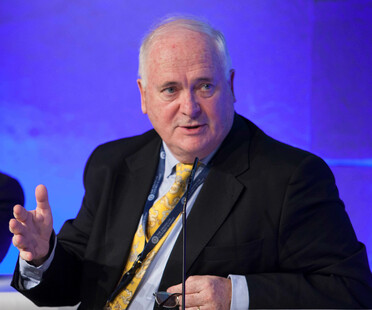Bruton will be remembered singularly for his contributions, especially in articulating a distinct version of Irish nationalism, particularly regarding Northern Ireland.

John Bruton speaking at a Finance Dublin conference in Dublin Castle in 2017.
This led him to question at one point whether effective nationhood might have just as readily been achieved without resort to the revolutionary violence of 1916 and the War of Independence, a position that has seen him likened to a founding father of the USA questioning the American revolution, the contextual difference being that Bruton was referring to a 20th century event and political system, compared with one of the 18th century.
He was equally visionary, and impactful in other areas - notably with regard to the development of democratic institutions in the Republic, specifically in the Oireachtas. This, a little recognised aspect of his contribution, was that he pioneered democratic reform in the Dail and Senate, fostering the Committee System that has become so vigorous today, and empowering of backbenchers - notably, for example in the parliamentary investigations into affairs at the state broadcaster, RTE. Serving two stints as finance minister, as well as Taoiseach in economics, finance, and financial services, his contributions were also foundational and perhaps in the most significant area of all for the economy - as the initiator of Ireland’s 12.5% corporation tax regime.
He announced this in March 1997, when he was Taoiseach, and it was introduced by his Minister for Finance at the time, Ruairi Quinn, the first Labour Party minister to serve as Finance Minister.
As documented in the officially commissioned Irish Department of Finance 1959-1999 by Dr Ciaran Casey, (published in 2022) the Irish Government was warned by the European Commission in 1997 that its historic rates of 10% tax would fall foul of state aid rules, and it was faced with a dilemma.
Finance officials estimated that if a 10% rate was applied to all sectors there would be a ‘deadweight’ loss of corporation tax revenue of £590 m a year, and £340 m a year at a rate of 13%, (£190m at 15%), Casey writes.
In the event, the Government opted for what was arguably the bravest ever macroeconomic tax reform when they announced the 12.5% corporate rate for all sectors in May 1997. This decision was subsequently credited as well founded in research published as early as 2001 by Dr Patrick Honohan, and in research in the ESRI’s journal the Economic & Social Review, which has not been seriously challenged since.
Bruton, was the first finance minister to introduce financial incentives for the financial services industry, recognising a pilot project that had been introduced by the IDA, (originally the “Industrial Development Authority”), which sought to expand its mandate into the services sector, including three targeted areas, engineering services, software, and financial services.
Bruton’s initial incentives, enacted in the 1980s during his first term as finance minister subsequently saw effective fruition with the agreement of the EEC to enable the IFSC project which initiated the modern IFSC with the 10% concessionary tax rate introduced in 1987 by the subsequent Government under Charles Haughey.
This early engagement in the area was echoed in later years, when Bruton became the first chair of IFSC Ireland, and more recently through his chairmanship of “Ireland for Law”.
(Ken O’Brien, editor).
